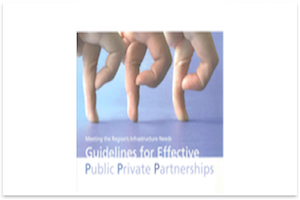 Meeting the Region's Infrastructure Needs - Guidelines for Effective Public Private Partnership
Meeting the Region's Infrastructure Needs - Guidelines for Effective Public Private Partnership
Edited by Jean-Luc Le Bideau, Bill Shields, Christopher Findlay, Manfred Wilhelmy and Eduardo Pedrosa
Sponsored by the Pacific Economic Cooperation Council (PECC)
Published in 2006 by PECC International Secretariat
These guidlines follow in the tradition of PECC consensus-building on key topics including: Encouraging International Investment in the Asia Pacific Region: A Draft Asia Pacific Investment Code (1994 - Trade Policy Forum); PECC Competition Principles: PECC Principles for Guiding the Development of a Competition-Driven Policy Framework for APEC Economies (1999 - Trade Policy Forum); Guidlines for Good Corporate Governance Practice (2001 - Peer Assistance and Review Network (PARNet)); Proposals for an APEC Common Understanding on RTAs (2003 - Trade Forum and RTA Task Force).
This document is the culmination of an extensive process of consultation and consensus building. Together with governments, private operators, international financial institutions and non-governmental organizations PECC held three regional seminars, the first in Sydney in December 2004 addressed the development of PPPs for essential infrastructure services in Asian economies, the second in Santiago, in December 2005, was more oriented towards specific Latin America issues related to PPPs, and a concluding seminar in Sydney in November 2006, when these Guidlines were officially introduced. PPPs for Infrastructure Development were also the subject of a plenary session at the Sixteenth PECC General Meeting held in Seoul in September 2005.
With these PPP Guidlines, PECC aims to help government state, municipalities, operators and financial institutions to build the infrastructure and public services of tomorrow, and to manage them on a long-term basis. They define the function and impact of PPPs in the financing of infrastructure projects and set a framework for more transparent and efficient PPPs.
Contents:
1. Inclusive Development and Affordability
2. Trust and cooperation
3. Stability and predictibility
4. Accountability and risk management
5. Infrastructure financing optimization
